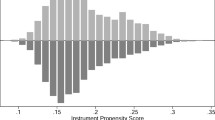Abstract
The paper analyzes the individual and regional determinants of unemployment benefit sanctions in Germany. On the basis of an administrative data set a multilevel hazard rate model in discrete time for the transitions into a sanction is estimated, controlling for unobserved heterogeneity on the individual and regional level. It is shown that certain benefit recipients, e.g. younger people, are more likely to receive sanctions than e.g. older, disabled, or skilled individuals. Moreover, the risk of being sanctioned not only depends on individual characteristics but is also influenced by the sanction policies of the employment agencies.
Zusammenfassung
Der Beitrag untersucht individuelle und regionale Determinanten von Sanktionen, die Unterstützungsleistungen arbeitsloser Leistungsempfänger in Deutschland mindern. Auf Basis von Geschäftsdaten der Bundesagentur für Arbeit wird ein multivariates Abgangsratenmodell für die Übergänge in eine Sanktion in diskreter Zeit spezifiziert, das unbeobachtete Heterogenität auf individueller und regionaler Ebene kontrolliert. Das individuelle Sanktionsrisiko ist neben individuellen Merkmalen und dem Verhalten des Arbeitslosen von der Sanktionierungsintensität der regionalen Arbeitsagenturen abhängig.
Similar content being viewed by others
References
Abbring JH, Van den Berg GJ, Van Ours JC (2005) The effect of unemployment insurance sanctions on the transition rate from unemployment to employment. Econ J 115:602–630
Allison P (1982) Discrete time methods for the analysis of event histories. Sociol Methodol 13:61–98
Ashenfelter O, Ashmore D, Desch^enes O (2005) Do unemployment insurance recipients actively seek work? Evidence from randomized trials in four U.S. states. J Econom 125(1–2):53–75
Benus JM, Joesch JM, Johnson TR, Klepinger DH (1997) Evaluation of the Maryland unemployment insurance work search demonstration, Final Report. Maryland Department of Labor, Licensing and Regulation Office of Unemployment Insurance, Baltimore
Dolton P, O’Neill D (1996) Unemployment duration and the restart effect: some experimental evidence. Econ J 106:387–400
Eichhorst W, Grienberger-Zingerle M, Konle-Seidl R (2006) Activation policies in germany: from status protection to basic income support, IZA Discussion Paper. Forschungsinstitut zur Zukunft der Arbeit (Institute for the study of labor), Bonn
Fredriksson P, Holmlund B (2003) Improving incentives in unemployment insurance: a review of recent research, Working Paper. IFAU – Institute for Labour Market Policy Evaluation, Uppsala
Goldstein H (1995) Multilevel statistical models. Arnold, London et al.
Gorter C, Kalb GRJ (1996) Estimating the effect of counseling and monitoring the unemployed using a job search model. J Hum Resour 31(3):590–610
Heckman JJ, Singer B (1984) A method for minimizing the impact of distributional assumptions in econometric models for duration data. Econometrica 52(2):271–320
Jensen P, Nielsen MS, Rosholm M (1999) The effects of benefits, incentives, and sanctions on youth unemployment, Working Paper. Centre for labour market and social research, Aarhus, Denmark
Johnson TR, Klepinger DH (1994) Experimental evidence on unemployment insurance work-search policies. J Hum Resour 29(3):695–717
Kalbfleisch JD, Prentice RL (2002) The statistical analysis of failure time data. Wiley-Interscience, New York
Klepinger DH, Johnson TR, Joesch JM (2002) Effects of unemployment insurance work search requirements: The Maryland Experiment. Ind Lab Rel Rev 56(1):3–22
Lalive R, van Ours JC, Zweimüller J (2005) The effect of benefit sanctions on the duration of unemployment. J Eur Econ Assoc 3(6):1386–1417
Lancaster T (1990) The econometric analysis of transition data. Cambridge University Press, Cambridge
Meyer BD (1995) Lessons from the U.S. unemployment insurance experiments. J Econ Lit 33(1):91–131
Müller K-U (2007) Observed and unobserved determinants of benefit sanctions in Germany. Evidence from matched individual and regional administrative data, WZB Discussion Paper (SP I 2007-107). Wissenschaftszentrum Berlin für Sozialforschung, Berlin
Müller K-U, Oschmiansky F (2006) Die Sanktionspolitik der Arbeitsagenturen nach den ‘Hartz’-Reformen. Analyse der Wirkungen des ‘Ersten Gesetzes für moderne Dienstleistungen am Arbeitsmarkt’, WZB Discussion Paper. Wissenschaftszentrum Berlin für Sozialforschung, Berlin
Rabe-Hesketh S, Skrondahl A, Pickles A (2004) Gllamm manual, U.C. Berkeley Division of Biostatistics Working Paper Series. University of California, Berkeley
Van den Berg GJ, Van der Klaauw B (2006) Counseling and monitoring of unemployed workers: theory and evidence from a controlled social experiment. Int Econ Rev 47(3):895–936
Wilke RA (2004) Eine empirische Analyse von Sanktionen für Arbeitslose in Westdeutschland während der 1980er und 1990er Jahre. Zeitschrift für ArbeitsmarktForschung 37(1):45–52
WZB and infas (2006) Evaluation der Maßnahmen zur Umsetzung der Vorschläge der Hartz-Kommission. Modul 1a – Neuausrichtung der Vermittlungsprozesse, Bericht für das Bundesministerium für Wirtschaft und Arbeit. Wissenschaftszentrum Berlin für Sozialforschung (WZB) and Institut für Angewandte Sozialwissenschaft (Infas), Berlin, Bonn
Author information
Authors and Affiliations
Corresponding author
Additional information
JEL classification
J64, J65, J68
Rights and permissions
About this article
Cite this article
Müller, KU. Individual and regional determinants of receiving unemployment benefit sanctions in Germany . Wirt Sozialstat Archiv 1, 275–286 (2007). https://doi.org/10.1007/s11943-007-0022-7
Received:
Accepted:
Published:
Issue Date:
DOI: https://doi.org/10.1007/s11943-007-0022-7
Keywords
- Unemployment insurance benefit sanctions
- Duration analysis
- Multi-level models
- Unobserved heterogeneity
- GLLAMM
- Administrative data



